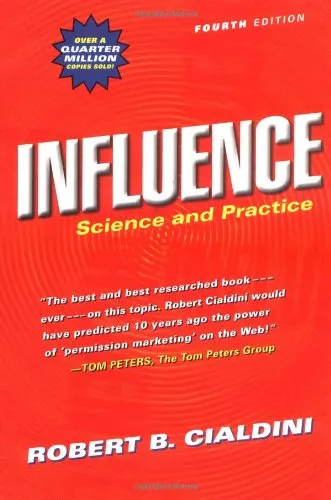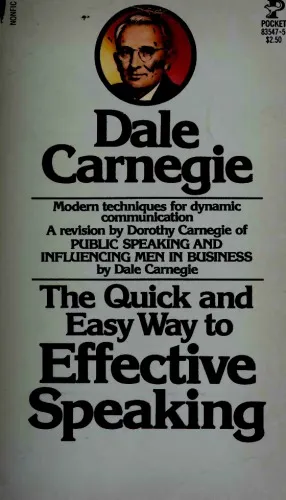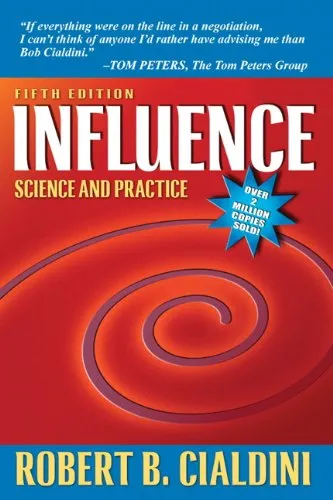Influence: Science and Practice
5.0
Reviews from our users

You Can Ask your questions from this book's AI after Login
Each download or ask from book AI costs 2 points. To earn more free points, please visit the Points Guide Page and complete some valuable actions.Related Refrences:
Introduction to 'Influence: Science and Practice'
Welcome to a detailed exploration of "Influence: Science and Practice," a seminal work by Robert B. Cialdini. In this book, readers are taken on an enlightening journey through the mechanisms of influence and how they operate in our daily lives. Cialdini, with his profound understanding of human psychology, opens a window into the realm of persuasion, making this book a must-read for anyone looking to grasp the art and science of influence.
Detailed Summary of the Book
"Influence: Science and Practice" is grounded in rigorous research and is designed to provide both theoretical and practical insights into the process of persuasion. Cialdini identifies six key principles that underlie the art of persuasion: Reciprocity, Commitment and Consistency, Social Proof, Authority, Liking, and Scarcity. Each principle is explored in detail, supported by empirical research and real-world examples that illustrate their power and impact.
The principle of Reciprocity refers to the intrinsic human tendency to return favors. Cialdini explains that when people receive something, they feel compelled to give back. Commitment and Consistency relate to the desire to align actions with proclamations. When individuals make commitments, especially publicly, they strive to conform to those commitments.
Next, Social Proof outlines how individuals often look to the behavior of others when making decisions, especially in situations of uncertainty. Authority reveals the extent to which people are influenced by perceptions of expertise, while Liking demonstrates that people are more easily persuaded by people they like. Lastly, Scarcity captures how limited availability or a perceived rarity increases desirability.
Key Takeaways
- Understanding the principles of influence can significantly enhance one's ability to persuade and communicate effectively.
- Being aware of these principles can also protect individuals from being unconsciously manipulated.
- Each principle is rooted in social psychology and provokes automatic responses that often drive human behavior.
- The book blends anecdotal evidence with scientific research, making it accessible and applicable to a wide audience.
Famous Quotes from the Book
“A well-known principle of human behavior says that when we ask someone to do us a favor, we will be more successful if we provide a reason.”
“The truly gifted negotiator is able to get what he wants largely because he’s so eminently likable.”
“Where all think alike, no one thinks very much.”
Why This Book Matters
The significance of "Influence: Science and Practice" lies in its universal applicability and its ability to bridge the gap between academic theory and real-world practice. It is invaluable to marketers, negotiators, managers, and essentially anyone who wishes to influence others. Furthermore, by exposing the psychological triggers of influence, Cialdini effectively arms readers against manipulation, fostering more informed decision-making in both personal and professional spheres.
Cialdini's work is not only a toolkit for persuasion but also a reflective lens on human nature. It encourages self-awareness regarding susceptibility to influence and promotes ethical influence practices. By understanding and respecting the principles outlined in this book, individuals can improve their ability to lead, sell, and inspire, while ensuring their decisions are fair and well-grounded.
Ultimately, "Influence: Science and Practice" continues to stand as a foundational text in the fields of psychology and persuasion, offering timeless insights into the subtle forces that shape human behavior.
Free Direct Download
You Can Download this book after Login
Accessing books through legal platforms and public libraries not only supports the rights of authors and publishers but also contributes to the sustainability of reading culture. Before downloading, please take a moment to consider these options.
Find this book on other platforms:
WorldCat helps you find books in libraries worldwide.
See ratings, reviews, and discussions on Goodreads.
Find and buy rare or used books on AbeBooks.
2132
بازدید5.0
امتیاز0
نظر98%
رضایتReviews:
5.0
Based on 0 users review
Questions & Answers
Ask questions about this book or help others by answering
No questions yet. Be the first to ask!













